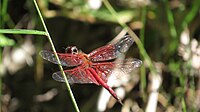Tramea eurybia
Appearance
(Redirected from Trapezostigma eurybia)
| Dune glider | |
|---|---|

| |
| Male | |
| Scientific classification | |
| Domain: | Eukaryota |
| Kingdom: | Animalia |
| Phylum: | Arthropoda |
| Class: | Insecta |
| Order: | Odonata |
| Infraorder: | Anisoptera |
| Family: | Libellulidae |
| Genus: | Tramea |
| Species: | T. eurybia
|
| Binomial name | |
| Tramea eurybia | |

| |
Tramea eurybia is a species of dragonfly in the family Libellulidae,[3] known as the dune glider.[4] It inhabits still waters on the Andaman Islands, Sumatra, Sulawesi, the Maluku Islands, New Guinea and Fiji;[5] and can be found at dune lakes in eastern Australia.[3][6] It is a medium-sized dragonfly with red, brown and black markings and a distinctive dark patch at the base of the hindwing.[4]
Tramea eurybia appears similar to Tramea stenoloba.[4]
Gallery
[edit]-
Bright red wing venation in male
-
Male face
-
Male
-
Female wings
-
Male wings
See also
[edit]References
[edit]Wikimedia Commons has media related to Tramea eurybia.
- ^ Dow, R.A. (2017). "Tramea eurybia". IUCN Red List of Threatened Species. 2017: e.T83370603A83384627. doi:10.2305/IUCN.UK.2017-1.RLTS.T83370603A83384627.en. Retrieved 20 November 2021.
- ^ Selys-Longchamps, E. (1878). "Odonates de la région de la Nouvelle Guinée". Mittheilungen aus dem K. Zoologischen Museum zu Dresden (in French). 3: 289–323 [298] – via Biodiversity Heritage Library.
- ^ a b "Species Tramea eurybia eurybia Selys, 1878". Australian Faunal Directory. Australian Biological Resources Study. 2012. Retrieved 23 February 2017.
- ^ a b c Theischinger, Günther; Hawking, John (2006). The Complete Field Guide to Dragonflies of Australia. Collingwood, Victoria, Australia: CSIRO Publishing. p. 298. ISBN 978 0 64309 073 6.
- ^ Watson, J.A.L.; Theischinger, G.; Abbey, H.M. (1991). The Australian Dragonflies: A Guide to the Identification, Distributions and Habitats of Australian Odonata. Melbourne: CSIRO. p. 278. ISBN 0643051368.
- ^ Theischinger, Gunther; Endersby, Ian (2009). Identification Guide to the Australian Odonata. Department of Environment, Climate Change and Water NSW. p. 240. ISBN 978 1 74232 475 3.






